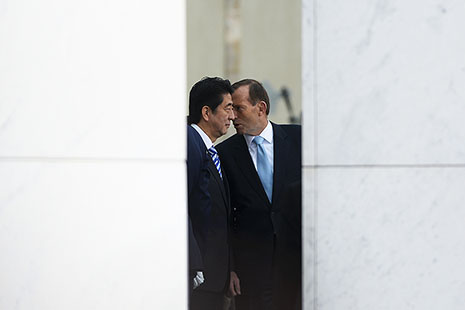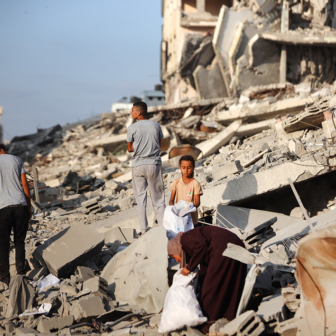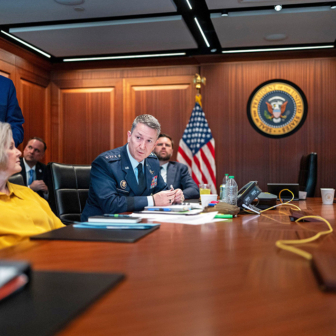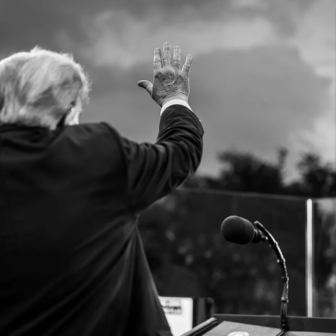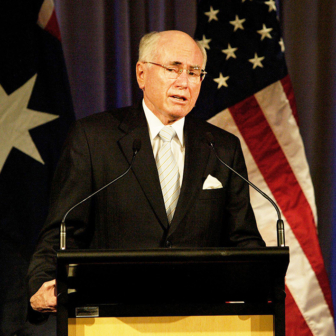While Japan’s prime minister Shinzo Abe was making a historic address to the Australian parliament last week, in Perth a group of scholars and other experts was launching a network called Active Peacemaking in Australia and Japan. Concerned at the current direction of the Australia–Japan relationship, our plan is to develop a different vision for the Australia-Japan relationship and for peace in our region.
Peace is often defined in passive or neutral terms – as the absence of war, a welcome but temporary pause between inevitable conflicts. Yet some people see Article 9 of Japan’s postwar constitution, which formally renounces war and prohibits Japan’s military from taking action overseas, as an aberration, or simply as a punishment for Japan’s defeat in the second world war. Given the progress Japanese society has made in the almost seventy years since the end of the war (so the argument goes) it is time to put aside this outdated document – time for Japan to step up to its responsibilities in the Asia Pacific, a region where the balance of power is dramatically shifting.
Rather than being an aberration, we believe that Article 9 symbolises an active stance for peace that should become a regional and, indeed, a global objective.
Abe is not the first prime minister to challenge Article 9. But there are several reasons why his government’s recent “reinterpretation” of the constitution to allow for overseas Japanese military action is particularly concerning.
First, Japan’s internal political, economic and social landscape is at a crucial turning point. Already troubled by underemployment, ageing and general malaise, the triple disaster of 11 March 2011 further complicated the scene. Some Japanese citizens rally for a “stronger” Japan both at home and abroad, while others increasingly mistrust authorities (both politicians and corporations) and see a grim future in which the lessons of Japan’s past are foolishly cast aside. “Abenomics,” the supposed cure for Japan’s ills, is an uncertain and risky experiment, one of whose key unspoken elements is a substantial expansion of Japan’s military industries and arms exports.
A second concern is the process by which the Japanese government’s reinterpretation of the constitution occurred. It took the form of a cabinet decision formulated with no real public consultation, in defiance of majority public opposition, and disregarding the separation of powers and the norms of constitutional democracy.
The despair that current developments are generating in some sections of the Japanese community was tragically illustrated in late June, when, after making an impassioned defence of the constitution, a man set himself on fire in Tokyo’s Shinjuku district. Yet this event was not covered by NHK, the national public broadcasting company. Turning a blind eye to this despair is reminiscent of Japan’s troubled relationship with China and Korea before, during and after the second world war.
But Japan is not the only place where silence and growing government secrecy conceal despair. Events there are strangely echoed in Australia, where the new federal government violates democratic norms and humanitarian values by imposing a blanket of silence and secrecy over its treatment of asylum seekers. Mutual disregard for constitutional principles and open governance is a poor basis for a deeper Australia–Japan relationship.
The third problem with Japan’s constitutional reinterpretation is that it comes at a time of greatly heightened tensions between Japan and its Asian neighbours, particularly China. Though Chinese actions are among the prime reasons for these tensions, they have also been heightened by provocative actions and statements from Japan. There are real fears that East Asia is heading for a second cold war, and that Australia and other countries of the region are being pushed into an unenviable and dangerous choice between being “pro-Japan” or “pro-China.”
In his speech to the Australian parliament, prime minister Abe promised that Australia and Japan would now join in a “rugby scrum to protect peace.” The following day, Tony Abbott praised the “sense of honour” shown by Japanese troops during the Asia–Pacific war. The proposed scrum (in which the other dominant partner is the United States) involves the construction of a massive and environmentally disastrous US heliport at Henoko in Japan’s southern prefecture of Okinawa (bitterly opposed by local residents) and is likely to include further expansion of American military bases in Australia. It also opens the way to a possible presence of Japanese military forces on Australian soil. In a strikingly Orwellian turn, Abe calls his plans for military expansion “positive pacifism.”
An alternative approach to peace in our region is possible. We call this “active peacemaking,” and we believe that – as two major democracies in our region – Japan and Australia should play a key role in this process.
Active peacemaking means addressing the real issues that threaten the security of the people of our region – issues like the continuing disaster in Fukushima, where tens of thousands of people are still living, largely forgotten, as disaster refugees. It means cooperating to build better responses to climate change and energy security. It means talking about a sustainable solution to regional and global refugee crises, not joining a race to the bottom of the humanitarian league table. It means seeking ways to promote dialogue between Japan, China and Korea, rather than aggravating their conflicts through historical amnesia.
It is the hope of this group that concerned individuals, groups and communities will join in creating an alternative approach to these crucial issues. •
